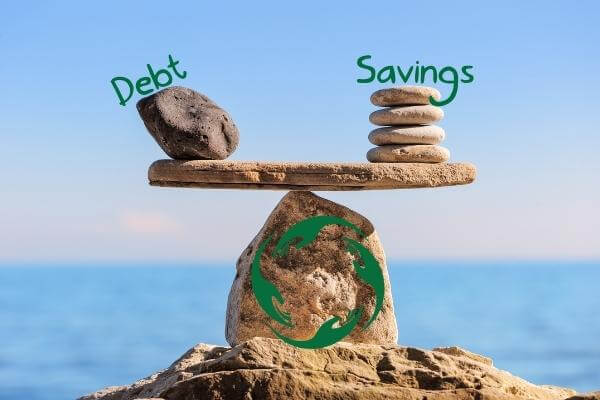A common question we get asked is should I pay off my debt or should I be saving?
The answer depends on your situation. Ideally you pay off debt, and you save! This is the classic case of having your cake and eating it. Debt typically incurs interest, so the amount of your loan that you are repaying with each payment will depend on the interest rate. The interest is a cost and the higher the interest rate the more that debt is costing you.
Saving can earn you interest though in today’s market you are typically earning very little interest. Just because you are earning only a small amount of interest does not mean to say that you shouldn’t be saving. If you currently have no funds available for emergencies, then saving is just as high a priority as paying off the debt.
With inflation, everyday costs are going up at a rapid rate. The media is reporting that fuel is going to be costing us $3 per litre very soon. We are all noticing that the cost of our regular grocery shop has gone up, the $100 you spent at the supermarket will buy you less than it did this time last year or even 6 months ago. With the continued supply chain issues we can expect the prices of everyday necessities to keep going up. Have you adjusted your budget recently? It may be a good time to look back at your spending in the last few months and see whether that still fits with your income.
So back to the question, do I pay off the debt or save?
If you are paying a high interest rate for your debt, then you’ll definitely want to be paying down your debt or refinancing that debt to a lower interest rate. However, there is a balance between paying off the debt and saving. Having funds available for emergencies and for costs you will incur when you go to purchase a house (if that is what you were saving for) is essential. Having existing debt when you go to buy a house may not prevent you from being able to purchase the house, it will all depend on your ability to service the existing debt and the new mortgage for your home.
The ability to service the debt will depend on your spending and your income. If we can show the banks that you are meeting your financial obligations, then you have a good chance of refinancing your debt to a cheaper interest rate. It is important to continue making payments towards your debts because late payments or failure to make payments affects your credit rating. Lenders want to know that you are going to make your payments on time, every time. It can be scary, embarrassing, and stressful when you are juggling rising costs while your income is staying the same.
When you may be struggling to meet your financial commitments it is important to tackle the situation head on and not bury your head in the sand!
Doing this by yourself is stressful. You may not know the options available to you and how to assess what to tackle first. At Building on Basics we focus on solutions, not why you got into the situation. Our no-judgement approach can help take the stress out of the situation and get you into your home or debt-free, whatever your goal is!
To sum up our thoughts on whether to pay down debt or focus on saving: If you have no reserves then you need to do some saving (even if it is $50 per week) and then use any other surplus funds to focus on paying down your debts.
Knowing which debt to tackle first is easy! Pay down the loan with the highest interest rate first. Don’t be fooled, sometimes the highest interest rate is not the one that you expect. Account overdrafts can have interest rates between 12- 20%, which may be a lot higher than your credit card interest rate. While paying down the highest cost loan as quickly as possible is important, we suggest you talk to us about your situation as we may be able to find a lender that can give you a cheaper interest rate. By doing a debt transfer to a lender with a better rate those same repayments that you had been managing will allow you to pay your debt off even faster.

